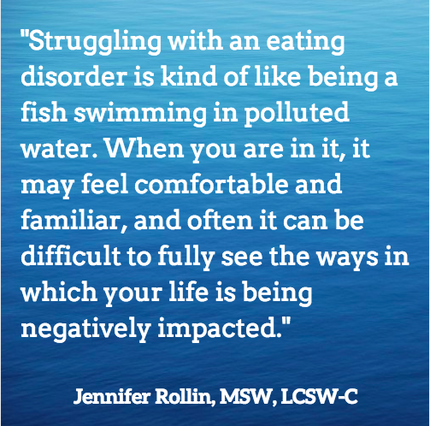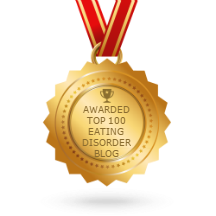- Home
- About
-
Services
- Therapy
-
Eating Disorder Trainings
>
- Clinical Approaches To Treating Body Image Issues
- Clinical Approaches To Treating Bulimia & Binge Eating Disorder
- Finding Freedom From Binge Eating
- Finding Freedom From Anorexia
- Supporting A Loved One With An Eating Disorder
- Eating Disorder Recovery Road Map
- Healing From Body Hate And Practicing Self-Compassion
- Common Questions
- Blog
- Press
- Contact
|
"I don’t know why I’m so obsessed with my weight...I feel like I’m just shallow.” Full stop. As an eating disorder therapist, I can’t tell you the number of times that I have heard this kind of statement from a client in recovery. Often people with eating disorders struggle with feelings of shame around their thoughts or behaviors. This is unfortunately, frequently reinforced and perpetuated by our culture. A few celebrities (I’m looking at you Meghan Trainor and Amy Schumer) have made jokes that they didn’t have the “willpower” to have an eating disorder. You Aren’t Shallow Here’s the thing. An eating disorder isn’t just “a diet gone to far,” “willpower or lack there of,” or someone who is simply vain or shallow. Eating disorders are the deadliest mental illness. They are caused by a combination of genetic, biological, temperamental, and environmental factors. Symptoms often manifest with a preoccupation around food and weight. However, that’s generally the tip of the iceberg. Eating disorder treatment is about helping people to develop a healthy relationship to food and their bodies. It also entails helping clients learn how to process and cope with intense emotions, work through any potential underlying trauma, and develop a more compassionate way of relating to themselves. Additionally, the fact that my clients are so upset with the idea that “they are shallow” is a clear indicator that they are not, because the eating disorder fixation on weight and body often goes completely against their true values. It’s a Half-Life Struggling with an eating disorder often feels like living a half-life. Even if on the surface you are accomplishing things, there is often part of you that is numbed out, unhappy, or disconnected. Many people also initially struggle with constant thoughts about food, weight, and their body. Struggling with an eating disorder is kind of like being a fish swimming in polluted water. When you are in it, it may feel comfortable and familiar, and often it can be difficult to fully see the ways in which your life is being negatively impacted. Eating disorders aren’t a choice. Many of my clients initially blame themselves for developing an eating disorder. But having an eating disorder is NOT your fault. It was completely not your choice to get sick, however working on recovery is a choice. It’s a decision that you may have to make over and over again, until you are recovered and it’s simply a way of being. Jennifer Rollin, MSW, LCSW-C: is an eating disorder therapist in private practice in Rockville, Maryland. Jennifer specializes in helping teens and adults struggling with anorexia, binge eating disorder, and bulimia, and body image issues. Jennifer provides eating disorder therapy in Rockville, MD, easily accessible to individuals in Potomac, North Potomac, Bethesda, Olney, Germantown, and Washington D.C. Connect with Jennifer through her website: www.jenniferrollin.com Jennifer also offers online trainings for professionals on eating disorders and body image issues.
4 Comments
5/4/2018 04:36:31 pm
Thanks for saying that having an eating disorder is not your choice in getting sick, however, it is your choice to make a recovery. That is a concept that my niece is struggling with ever since she started getting into her teenage years. Her parents didn't think of it at all at first, but I think that now they are getting worried. I will be sure to pass this information on so that my niece can get the help she needs.
Reply
7/14/2022 11:11:54 pm
This was a great and interesting article to read. I have really enjoyed all of this very cool and fun information. Thanks
Reply
9/21/2022 09:00:33 am
I appreciate you providing this really useful article with anyone who may read or view it. Teenagers today are disproportionately affected by eating problems. I'm hoping this will benefit them.
Reply
Leave a Reply. |
About MeI'm an eating disorder therapist in private practice in Rockville, MD. Archives
June 2024
|



 RSS Feed
RSS Feed
